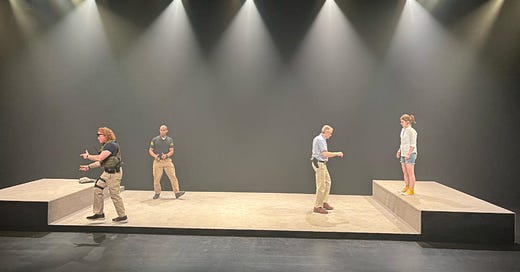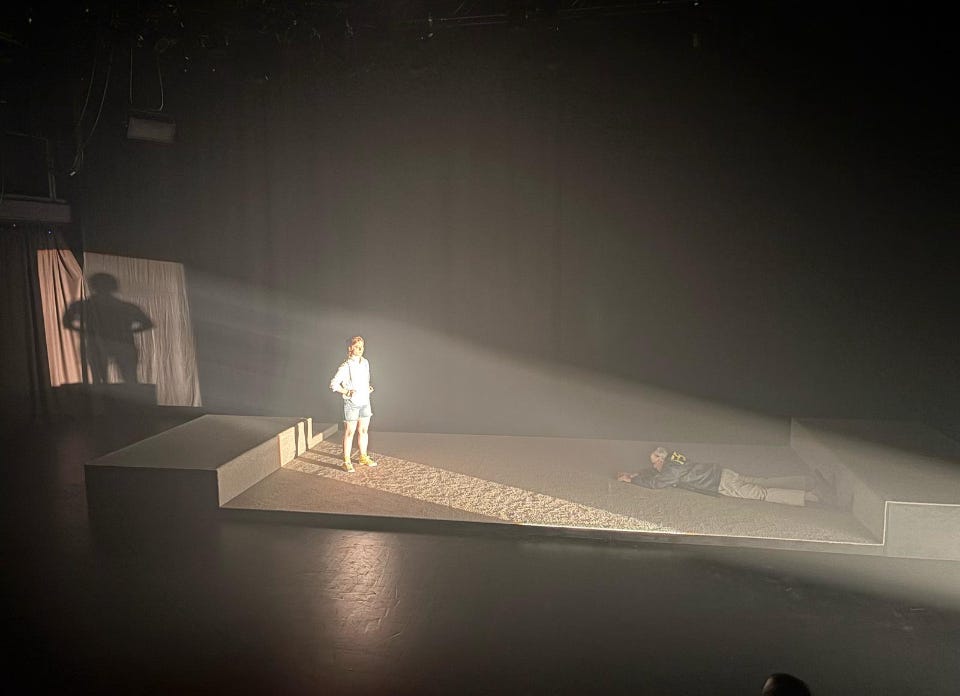The Reality We Forgot
The unrecognized heroism of Reality Winner in light of Tina Satter’s play
Welcome to Pancake Brain — a (free) weekly newsletter, fresh in your inbox most weekends :P
Do you remember Reality Winner? If not her story, perhaps only that unreal name, which would have paired more accurately with “Loser” as far as her interactions with the United States government are concerned. Reality Winner is the Air Force veteran and communications consultant who reported Russian interference in the 2016 election, the National Security Agency document that she sent to a news outlet called The Intercept was used as evidence in Congress. Reality Winner is the reason why Russian election interference was made public knowledge, and yet she sat in prison for five years, and, generally speaking, no one really gives a shit. Over the past month, I’ve had the opportunity to see Tina Satter’s play, Is This A Room, four times in three weeks, and each time I see it, I’m less sure whether or not it is a room, and increasingly sure that Reality Winner is an American hero, if that’s even a thing.
To see a play four times is a trippy experience. I’m the kind of person who will find a way to enjoy almost any piece of theatre, but I don’t want to see much twice, and the only other show I’ve seen many more times than once was Snatch Adams & Tainty McCracken Present It’s That Time of The Month, because it was created by and starring my beloved Snatch, the performance artist Becca Blackwell. There are allegedly no small parts, though Becca plays the smallest one in Is This A Room while looming large as Unknown Male, a conglomerate of about a dozen agents, played by Becca as an atmosphere of bureaucratic buffoonery also known as “UM.” The character name alone would be too good, if it wasn’t right there in the government transcript. We chalked it up to a free trip to Australia, and I didn’t see any kangaroos, because I was too busy seeing Is This A Room.
The play, which led to the 2022 film Reality starring Sydney Sweeney, was created by Tina Satter from the transcript of the audio recording made by the FBI while they searched Reality’s home in Augusta, Georgia. The question “Is this a room?” is just one idiotic bit of dialogue available as a matter of public record. Each time I see Is This A Room, I hear that line, and several others, a little different, finding it harder and harder to believe what I’m watching is not a scripted piece of theatre. With every viewing, new lines leap off the stage, asking for fresh readings. When one agent says Reality’s dog will no longer be comfortable in her enclosure, I hear the line about Reality, and again, when she says the dog needs to have her “little anxiety attack.” After the second, third, and, fourth final bow, my brain went running for new literary interpretations, before remembering, it’s a transcript. The playwright didn’t write a word. Satter’s brilliant work of art, then, is a low-fi waltz cast in an impeccable soundscape of lighting design that plays out over an unrounded halfpipe of ugly gray carpet. If you were to watch the actors sped up to the sound and lighting design with no dialogue, you would see a vicious chess match between three FBI agents and a 25-year-old woman wearing cutoffs and Pikachu Converse, alternately blacking out into redaction and anticipating her impending loss in gushing bursts of bright pink.
At Perth Festival this past February, Reality was played by Susannah Perkins with a cocktail of ferocity and fear that morphed mid inhale. Perkin’s Reality is far more powerful than Sweeney’s, throbbing in place of dispassion, Perkins tapped the terror of a trapped animal trying to come up with a better idea. There are two principle FBI agents closing in on Reality in the room that may or may not be a room. Pete Simpson’s lead officer is an onslaught of dad vibes with an undercurrent of bureaucratic violence, his dangerous absurdity in careful balance with his hardline partner, played by Will Cobbs with an unflinching gaze that sets the stakes of the play. I saw this show so many times, and it always managed to stress me out. In the play, the movie, and real life, Reality Winner is so damn smart, I wonder if she can find a way to win, even though I know she’s destined to lose.
Only a handful of people got to see Emily Davis originate the role of Reality in the Broadway run of Is This A Room, but the movie received decent traction, glowing reviews, and still not nearly enough of a conversation about what the hell actually happened, which is to say: Reality Winner sat in jail for five years for informing the American public that the Russian government interfered in the 2016 election.
The National Security Agency document that she submitted is titled, “Russia/Cybersecurity: MainIntelligence Directorate Cyber Actors… Target U.S. Companies and Local U.S. Government Officials, and, in fact, it’s much longer than that, the title, so there’s a picture below. This document details the process by which the Russian government logged into a private software company that supports American elections in eight states and sent emails containing malware to over a hundred officials. That document also contained the sources and methods targeted by the Russian government, which is the supposedly the reason Reality was sentenced to the maximum term of five years: because she compromised the sources and methods that had already been compromised by the Russian government, and, by the way, the NSA was never going to you anything about it.
I’ve heard people say they didn’t really realize the reality of Reality’s situation until they saw the movie, or the play, and then there is the problem of her political homelessness, even for those who followed the story when it broke. That Reality revealed that the Russian government interfered in the 2016 election was condemning Donald Trump, as was the fact that she had called him an “orange fascist.” Her situation is especially damning in contrast to the fleet of January 6th pardons, but Joe Biden didn’t do her any favors either. Sending the document to a left-leaning news outlet was a mistake, if only because The Intercept fumbled the exchange, revealing their source when they contacted the FBI for verification. In the transcript, once Reality is forced to admit that she printed the document, folded it in half, and snuck it out of the building in her panty hoes, she tells them why, “Seeing that information that had been contested back and forth, back and forth, in the public domain for so long, trying to figure out, with everything else that keeps getting released and keeps getting leaked, why isn’t this getting out there? Why can’t this be public?” The film version ends with a final quote from Reality, “I knew it was a secret. But I also knew I had pledged service to the American people.”
Where the left might have rallied in support, Reality was so unfortunately privileged as to be a white woman at a time when it was fun to hate them online, which is to say nothing of the complexity of her previous work as a drone operator who killed tons of people. The very paradox that prevented Reality Winner from receiving full throttle political support from any given side was not at all at odds within her, indeed, it seemed to be her mission statement. Her whole story subscribes to a sense of duty in which the military is humanitarian, that ideal which fuels the paradigm of American heroism supposedly meant to defend free and fair elections. Reality’s story exemplifies the ultimate mythos of our weaponized democracy project. If an American hero was ever a really thing, Reality Winner is it.
It’s old news that bears repeating, Reality Winner went to prison for five years for informing the public that Russia interfered in the 2016 election, and now the United States government is aligned with Russia in the war against Ukraine. That is the front page of the Sunday Times I’m trying to read through jet-lagged eyes, in the context of the White House cutting funding for pro-democracy programming through USAID, and attorney general Pam Bondi disbanding the FBI task force focused on foreign influence operations. There’s a lot we disagree on in this country, but I thought we were all at least least pretending to honor the integrity of our elections.
The ailing idea of what it means to be American, our supposed strength, values, and wealth, was yet again punctured as I landed back on U.S. soil on my way back home from Australia. At Los Angeles Airport, there were seventy-five customs lanes, about six people working, and one bad attitude. The officers yelled at people for inching their toes over the red tape and gave them a hard time if they didn’t know how to speak English, like it was some big gift to get into a country where we don’t have the workforce or technology to make a line flow smoothly. As I trudged through that giant hall with seventy-five lanes and only three of them open, hungry and sleep-deprived, the unanswered question of the Reality Winner case kept looping in my mind, “Is America even pretending to be first-world democracy anymore?” As I waited in line for the second hour, pushing my bag on the ground, setting it down, and picking it up again, crammed with the exhausted masses waiting to be let into the United States without an inch of dignity, never mind personal space, I couldn’t help but wonder, “Is this a room?”
Thank you for reading Pancake Brain. If you like the vibe, please subscribe and share. As always, I’ll see you in the comments :)









How did I forget how much I’ve always enjoyed your writing?! Excellent piece. So glad you’re here.
Shaking my head at the tragedy of Reality and the beauty of your writing.